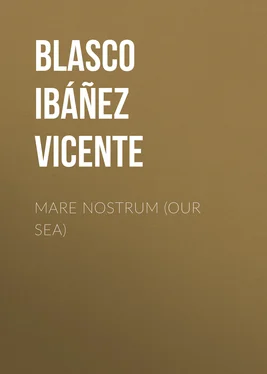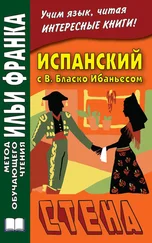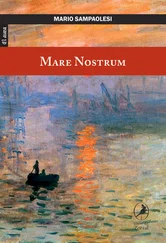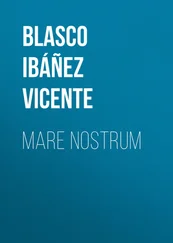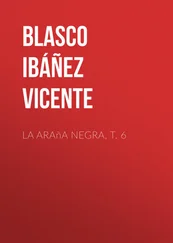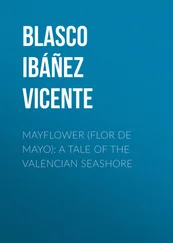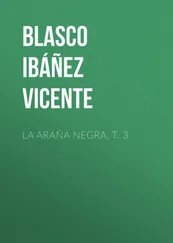Vicente Blasco Ibáñez - Mare Nostrum (Our Sea)
Здесь есть возможность читать онлайн «Vicente Blasco Ibáñez - Mare Nostrum (Our Sea)» — ознакомительный отрывок электронной книги совершенно бесплатно, а после прочтения отрывка купить полную версию. В некоторых случаях можно слушать аудио, скачать через торрент в формате fb2 и присутствует краткое содержание. Жанр: foreign_prose, foreign_antique, на английском языке. Описание произведения, (предисловие) а так же отзывы посетителей доступны на портале библиотеки ЛибКат.
- Название:Mare Nostrum (Our Sea)
- Автор:
- Жанр:
- Год:неизвестен
- ISBN:нет данных
- Рейтинг книги:5 / 5. Голосов: 1
-
Избранное:Добавить в избранное
- Отзывы:
-
Ваша оценка:
- 100
- 1
- 2
- 3
- 4
- 5
Mare Nostrum (Our Sea): краткое содержание, описание и аннотация
Предлагаем к чтению аннотацию, описание, краткое содержание или предисловие (зависит от того, что написал сам автор книги «Mare Nostrum (Our Sea)»). Если вы не нашли необходимую информацию о книге — напишите в комментариях, мы постараемся отыскать её.
Mare Nostrum (Our Sea) — читать онлайн ознакомительный отрывок
Ниже представлен текст книги, разбитый по страницам. Система сохранения места последней прочитанной страницы, позволяет с удобством читать онлайн бесплатно книгу «Mare Nostrum (Our Sea)», без необходимости каждый раз заново искать на чём Вы остановились. Поставьте закладку, и сможете в любой момент перейти на страницу, на которой закончили чтение.
Интервал:
Закладка:
Vicente Blasco Ibáñez
Mare Nostrum (Our Sea): A Novel
CHAPTER I
CAPTAIN ULYSSES FERRAGUT
His first gallantries were with an empress. He was ten years old, and the empress six hundred.
His father, Don Esteban Ferragut—third quota of the College of Notaries—had always had a great admiration for the things of the past. He lived near the cathedral, and on Sundays and holy days, instead of following the faithful to witness the pompous ceremonials presided over by the cardinal-archbishop, used to betake himself with his wife and son to hear mass in San Juan del Hospital ,—a little church sparsely attended the rest of the week.
The notary, who had read Walter Scott in his youth, used to gaze on the old and turreted walls surrounding the church, and feel something of the bard's thrills about his own, his native land. The Middle Ages was the period in which he would have liked to have lived. And as he trod the flagging of the Hospitolarios , good Don Esteban, little, chubby, and near-sighted, used to feel within him the soul of a hero born too late. The other churches, huge and rich, appeared to him with their blaze of gleaming gold, their alabaster convolutions and their jasper columns, mere monuments of insipid vulgarity. This one had been erected by the Knights of Saint John, who, united with the Templars, had aided King James in the conquest of Valencia.
Upon crossing the covered passageway leading from the street to the inner court, he was accustomed to salute the Virgin of the Conquest, an image of rough stone in faded colors and dull gold, seated on a bench, brought thither by the knights of the military order. Some sour orange trees spread their branching verdure over the walls of the church,—a blackened, rough stone edifice perforated with long, narrow, window-like niches now closed with mud plaster. From the salient buttresses of its reinforcements jutted forth, in the highest parts, great fabled monsters of weather-beaten, crumbling stone.
In its only nave was now left very little of this romantic exterior. The baroque taste of the seventeenth century had hidden the Gothic arch under another semi-circular one, besides covering the walls with a coat of whitewash. But the medieval reredos, the nobiliary coats of arms, and the tombs of the Knights of Saint John with their Gothic inscriptions still survived the profane restoration, and that in itself was enough to keep up the notary's enthusiasm.
Moreover the quality of the faithful who attended its services had to be taken into consideration. They were few but select, always the same. Some of them would drop into their places, gouty and relaxed, supported by an old servant wearing a shabby lace mantilla as though she were the housekeeper. Others would remain standing during the service holding up proudly their emaciated heads that presented the profile of a fighting cock, and crossing upon the breast their gloved hands,—always in black wool in the winter and in thread in the summer time. Ferragut knew all their names, having read them in the Trovas of Mosen Febrer, a metrical composition in Provençal, about the warriors that came to the neighborhood of Valencia from Aragon, Catalunia, the South of France, England and remote Germany.
At the conclusion of the mass, the imposing personages would nod their heads, saluting the faithful nearest them. "Good day!" To these, it was as if the sun had just arisen: the hours before did not count. And the notary with meek voice would enlarge his response: "Good day, Señor Marquis!" "Good day, Señor Baron!" Although his relations never went beyond this salutation, Ferragut used to feel toward these noble personages the sympathy that the customers have for an establishment, looking upon them with affectionate eyes for many years without presuming to exchange more than a greeting with them.
His son Ulysses was exceedingly bored as he followed the monotonous incidents of the chanted mass in the darkened, almost deserted, church. The rays of the sun, oblique beams of gold that filtered in from above, illuminating the spirals of dust, flies and moths, made him think in a homesick way of the lush green of the orchard, the white spots of the hamlets, the black smoke columns of the harbor filled with steamships, and the triple file of bluish convexities crowned with froth that were discharging their contents with a sonorous surge upon the bronze-colored beach.
When the embroidered mantles of the three priests ceased to gleam before the high altar, and another priest in black and white appeared in the pulpit, Ulysses would turn his glance toward a side chapel. The sermon always represented for him a half hour of somnolence, peopled with his own lively imaginings. The first thing that his eyes used to see in the chapel of Santa Barbara was a chest nailed to the wall high above him, a sepulcher of painted wood with no other adornment than the inscription: " Aqui yace Doña Constansa Augusta, Emperatriz de Grecia ,"—Here lies Constance Augusta, Empress of Greece.
The name of Greece always had the power of exciting the little fellow's imagination. His godfather, the lawyer Labarta, poet-laureate, could not repeat this name without a lively thrill passing across his grizzled beard and a new light in his eyes. Sometimes the mysterious power of such a name evoked a new mystery and a more intense interest,—Byzantium. How could that august lady, sovereign of remote countries of magnificence and vision, have come to leave her remains in a murky chapel of Valencia within a great chest like those that treasured the remnants of old trumpery in the garrets of the notary?…
One day after mass Don Esteban had rapidly recounted her history to his little son. She was the daughter of Frederick the Second of Suabia, a Hohenstaufen, an emperor of Germany who esteemed still more his crown of Sicily. In the palaces of Palermo,—veritable enchanted bowers of Oriental gardens,—he had led the life both of pagan and savant, surrounded by poets and men of science (Jews, Mahometans and Christians), by Oriental dancers, alchemists, and ferocious Saracen Guards. He legislated as did the jurisconsults of ancient Rome, at the same time writing the first verses in Italian. His life was one continual combat with the Popes who hurled upon him excommunication upon excommunication. For the sake of peace he had become a crusader and set forth upon the conquest of Jerusalem. But Saladin, another philosopher of the same class, had soon come to an agreement with his Christian colleague. The position of a little city surrounded with untilled land and an empty sepulcher was really not worth the trouble of decapitating mankind through the centuries. The Saracen monarch, therefore, graciously delivered Jerusalem over to him, and the Pope again excommunicated Frederick for having conquered the Holy Land without bloodshed.
"He was a great man," Don Esteban used to murmur. "It must be admitted that he was a great man…."
He would say this timidly, regretting that his enthusiasm for that remote epoch should oblige him to make this concession to an enemy of the Church. He shuddered to think of those sacrilegious books that nobody had seen, but whose paternity Rome was accustomed to attribute to this Sicilian Emperor—especially Los Tres Impostores (The Three Imposters), in which Frederick measured Moses, Jesus and Mahomet, by the same standard. This royal author was, moreover, the most ancient journalist of history, the first that in the full thirteenth century had dared to appeal to the judgment of public opinion in his manifestoes against Rome.
His daughter had married an Emperor of Byzantium, Juan Dukas Vatatzés, the famous "Vatacio," when he was fifty and she fourteen. She was a natural daughter soon legitimized like almost all his progeny,—a product of his free harem, in which were mingled Saracen beauties and Italian marchionesses. And the poor young girl married to "Vatacio the heretic," by a father in need of political alliances had lived long years in the Orient as a basilisa or empress, arrayed in garments of stiff embroidery representing scenes from the holy books, shod with buskins laced with purple which bore on their soles eagles of gold,—the highest symbol of the majesty of Rome.
Читать дальшеИнтервал:
Закладка:
Похожие книги на «Mare Nostrum (Our Sea)»
Представляем Вашему вниманию похожие книги на «Mare Nostrum (Our Sea)» списком для выбора. Мы отобрали схожую по названию и смыслу литературу в надежде предоставить читателям больше вариантов отыскать новые, интересные, ещё непрочитанные произведения.
Обсуждение, отзывы о книге «Mare Nostrum (Our Sea)» и просто собственные мнения читателей. Оставьте ваши комментарии, напишите, что Вы думаете о произведении, его смысле или главных героях. Укажите что конкретно понравилось, а что нет, и почему Вы так считаете.
